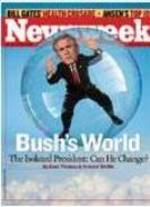Few companies have worked harder to be worthy of their trust than Google. (To the right, co-founders Larry Page and Sergey Brin.)
You can easily argue along the margins, about their cooperation with China, for instance, or some aspects of their San Francisco deal (whatever happened to that by the way) but I think they have tried to live up to their informal motto, "don’t do evil."
What do I make, then, of the protests against Google’s acquisition of DoubleClick, and its privacy implications?
No company, and no government, should be given absolute faith, absolute trust, and absolute control over the data users create. Everyone needs to have someone looking over their shoulder, someone with the power to cause enormous trouble.
In the American system we call such things "checks and balances."
Unfortunately we live in a decade where the whole idea of checks and
balances seems quaint. The American government demands absolute control
over its citizens, and gives no good answers when this is challenged.
So do other governments. Private companies act in much the same way,
perhaps inspired by the governments’ example.
But not so very long ago, back in the 1990s, this was not the case. We
had regulators, and impartial prosecutors, and judges untainted by
politics, who all had the power to demand that companies conform to
norms of behavior which went beyond mere law-breaking. These were
called regulations.
Regulations are not laws, in that they’re not designed to take the
freedom or lives of lawbreakers. Regulations are meant to moderate
corporate behavior, to keep everyone well away from real law-breaking.
You violate a regulation and you pay a fine, or you subject yourself to
closer scrutiny. It’s a cost of doing business which prevents you from
going over the legal edge.
When the very idea of regulation is rejected as being "government
interference with the market," and when the criminal justice system is
then corrupted by politics, as it has been, you are left with a
corporate equivalent of jungle law. The market demands companies do
everything they legally can to win in the market, and failure to do
that means market failure. If there is no referee to watch the fight,
and there is no sanction for your actions even after the fight, then
you better go in with brass knuckles — there is no other way.
That’s the real lesson of this entire decade. When everything becomes
politics, you no longer have a democratic, moral system. You are left
relying on the kindness of strangers.
Google has been a fairly benign, kind stranger. But unless effective
controls are placed on it, and on every other source of power, then you
can guarantee, as night follows day, that they will be followed by
strangers who are not so kind, not so benign, people who will take the
law of the jungle to its final conclusion.
There are many who argue that the Bush Administration has already
crossed these lines. But they haven’t crossed all of them. The fabric
is frayed, stretched, broken through in places. But it’s still there,
barely. And when it’s repaired (if it’s repaired), my fervent hope is that the concept of
regulation will return, that businesses will understand its value, and
that Google may be properly regulated in its own interests.














Good news
thank you
Good news
thank you